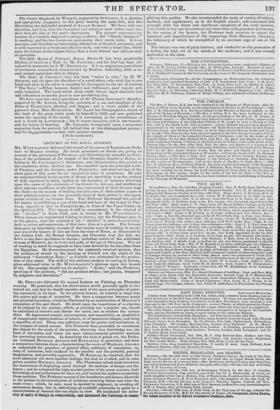LECTURES AT THE ROYAL ACADEMY.
MR. WEST MAC 0 T T delivered the second of his course of Lectures on Sculp- ture on Monday evening. Ile dwelt principally on Greek art, giving an account of the precursors of PHIDIAS, and illustrating his remarks by draw- ings of the pediments of the temple of the Olympian Jupiter at Egina, al- luding to iklr. COCKERELL'S discoveries, and characterizing this period as the conclusion of the Archaic age. He remarked upon the principal works of PIIIDIAS and his disciples, under PERICLES, and observed that in the short space of fifty years the art reached its acme of perfection. He paid an animated tribute to the merits of Greek art, describing it as the product of skill, regulated by mind, applied to the lactation of nature ; observing, upon the carries of the eminence of the Greeks in this art, and attributing their supreme excellence to the ideas they entertained of their descent fram the Gods—to the custom of making the education of their artists a part of their political system—to the personifications of their deities in the appro- priate varieties of the human form. The Professor illustrated this part of his lecture by exhibiting a cast of the head and bust of the statue by PIII- DIAS, opposite to that by PRAXITELES, in front of the Papal Palace, on the Quirinal Hill. This statue, it will be remembered, is the original of the "Achilles" in Ilyde Park, cast in bronze by Mr. WEsTstAcorr. These statuses are represented holding in horses ; but the Professor gave it as his opinion, that the original of his " Achilles" is more characteristic, both in action and expression, of that hero, than of a groom. The lecturer then gave an interesting account of the various ways of working in metal ; and traced the history of this art from the time of Moses, as illustrated by the Golden Calf, the Brazen Serpent, the Cherubim over the' Ark, &c. down to the later specimens in bronze ; including notices of. the celebrated statues of Minerva &c. in ivory and gold, of the age of PRIDIAS. The art of working in metal he supposed to have been derived by the Israelites from the Egyptians. He discountenanced the commonly received opinion, that the mixture of metals by the burning of Corinth was the origin of the celebrated " Corinthian Brass," as Corinth was celebrated for the produc- tion of that metal. The skill of this eminent sculptor in casting in bronze, gives additional value to Mr. WESTMACOTT'S opinions upon this branch of art. One precept should not be omitted : " Rules," said the Professor, speaking of the ancients, "did not produce artists ; but genius, tempered by judgment and discretion."


















 Previous page
Previous page